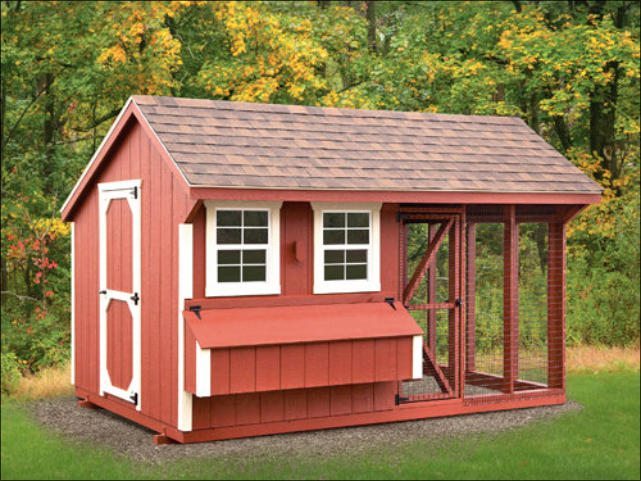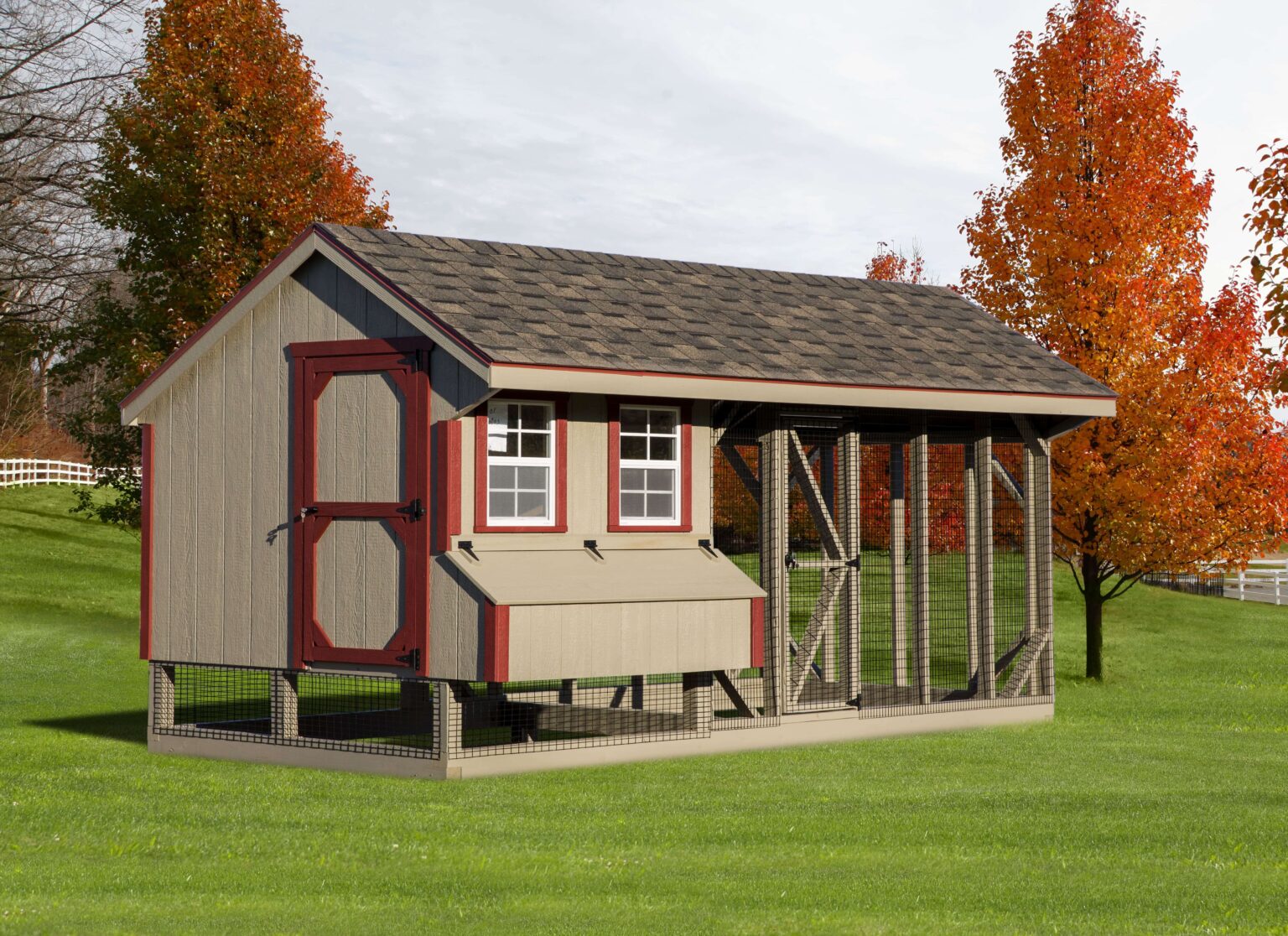
Deciding to raise chickens is a big decision that can benefit you in many ways. Whether you have one, two, or ten chickens, the most crucial thing to take into consideration is how you will keep them safe. Learning how to protect chickens from predators is imperative if you want to keep your chickens around for the long run.
In this blog, we’ll review different animals that eat chickens, and provide a variety of steps you can take to ensure your poultry is protected from any risks that come their way.
What Animals Eat Chickens?
The first step in learning how to protect chickens from predators is to know which animals you should be on the lookout for. Chickens are very vulnerable animals and are at a higher risk of being attacked than most birds. The animals that eat chickens will depend on where you live and your surroundings. Some of the most common predators include:
- Weasels
- Birds of Prey
- Raccoons
- Skunks
- Coyotes
- Opossums
- Foxes
- Bears
- Snakes
Once you know which animals to look out for, it’ll make protecting your chickens that much easier. You’ll be able to set up defenses specific to those animals that pose the largest threats.
How to Protect Chickens From Predators In 8 Easy Steps
Your location will have a lot to do with finding the best way to protect chickens from predators. However, there are some best practices you can put to use regardless of your location. Following these steps is the perfect way to get a better understanding of what your chickens need to survive and live happy and healthy lives.
1. Collect Eggs Daily
Don’t give your predators another reason to sneak around your chickens. Collecting your eggs daily will ensure that certain predators like snakes, rats, raccoons, and opossums won’t find their way into the coop at dusk. This will also eliminate the risk of your eggs being broken or cracked in the coop.
2. Know Your Enemy
Chickens are one of the most vulnerable animals because of the numerous predators they have. Knowing which animals in your area pose the greatest threat will allow you to take the necessary steps to keep those specific predators away.
3. Keep Them Out of the Dark
The most dangerous time for chickens is early morning and late at night because most predators try striking when it’s dark out. If you allow your chickens to roam free from time to time, make sure you’re doing this during daylight hours. They’ll be less likely to get attacked when the sun is out.
Another thing to remember is to keep track of all your chickens, when you close the coop up for the night, make sure all of your chickens are accounted for and safely locked inside their secure chicken coop.
4. Secure the Perimeter
Whatever you decide to use to keep predators away, make sure the perimeter is secured. This could include burying chicken wire, adding electric tape, or even installing motion sensor lights. Most predators will trigger a motion sensor and be scared away by a bright light.
Another thing to consider is your entire outdoor space. If you have a large open yard, you may want to install a larger fence around your property. This may not keep out every predator, but it will act as another line of defense for your chickens. Even securing other outdoor structures you may have can be beneficial. Doing this ensures you don’t leave an area where predators can make a home.
5. Check Your Defenses
Putting up defenses is only the first step in protecting your chickens. In order to ensure their safety, you need to keep up with whatever defense you put in place. This means you should frequently check your fence or netting, as well as any holes around the perimeter. Checking on your chickens will help to make sure you don’t miss any easy openings for predators to get inside.
6. Don’t Feed the Predators
If you feed the animals that come around your outdoor space, you’re giving them a reason to return. Even if you think feeding certain animals is harmless you could be putting your chickens at risk.
Making sure your garbage and recycling are stored properly, as well as cleaning your chicken coop regularly, can also play a role in keeping predators away.
7. Provide Cover
Keeping your chickens covered won’t only protect them from predators, but can also protect them from inclement weather. There are multiple ways to provide cover for your chickens from netting to roof sheathing.
Another way to add coverage is by adding shrubs or small trees around your chicken coop. Doing this will make them less visible to predators and could make it more difficult for animals to get to them.
8. Protect the Chicks
Chickens can be easy targets for predators, but baby chicks are even easier for animals to get. If you have chicks, you should do everything you can to keep them out of harm’s way. Using a strongly built chicken coop will usually guarantee their safety, but there are other tips you can follow to stay on top of any threats.
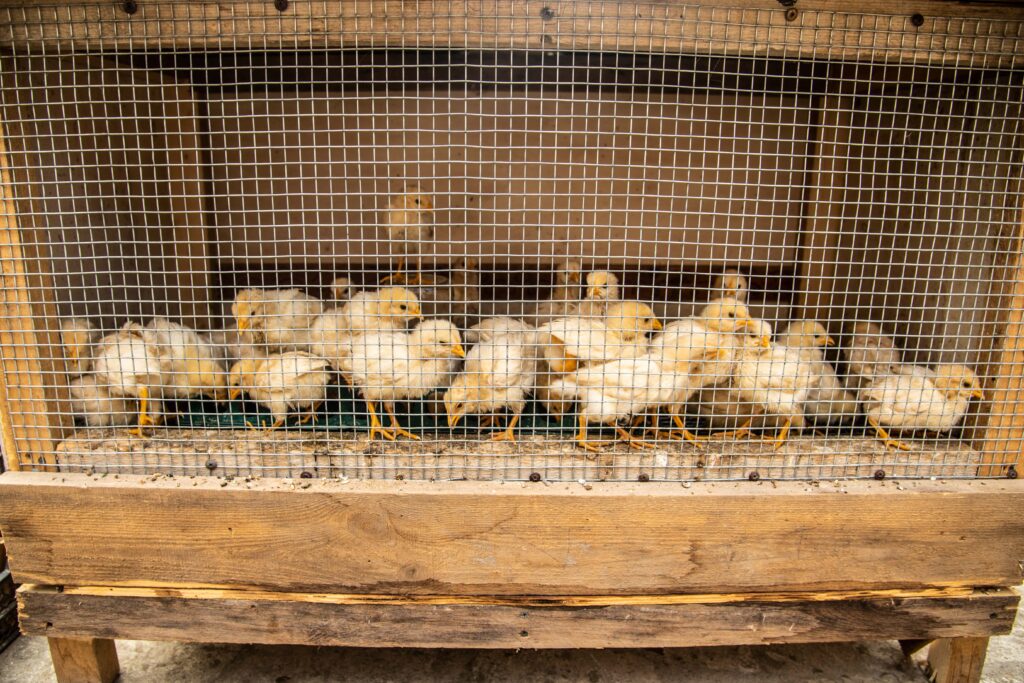
What is the Best Predator Netting for Chickens?
Learning how to protect chickens from predators takes some research. Many chicken owners have found that using predator netting for chickens is one of the easiest tactics to keep your birds safe.
There are different varieties of netting and each has its own advantages and disadvantages. Below, we’ve listed some of the most popular types as well as their uses.
Chicken Wire
Chicken wire is probably the most inexpensive option for containing chickens. However, it is the least effective when it comes to keeping predators out. Chicken wire is a great way to contain your chickens, especially if you’re not at risk for large predators or you have a livestock guardian dog.
It usually comes in a variety of heights ranging from 2-4 feet. If you have larger chickens that aren’t prone to flying, you could use a 2-foot high fence to keep chickens in. If your chickens are flighty you’ll want to double up and build a 4-6 foot fence.
Chicken wire is inexpensive and easy to handle, but it may not be the best choice for you. Take into consideration how at risk your chickens are when it comes to predators, as well as the weather since the wire is prone to rust. Evaluating these things will help you decide if the chicken wire will actually be effective.
Hardware Mesh
Hardware mesh is typically used for pens and outside areas of containment like large chicken runs. Since this type of mesh is more expensive it’s not very cost-effective to create an entire fence out of it. However, it does keep out virtually every predator (besides bears) if it is used effectively.
In order to keep out predators that dig, you should dig approximately 6-12 inches and lay the wire in the trench. Then, bend the wire outwards to form a small shelf-like structure that is approximately 6-12 inches.
If something is preventing you from digging, lay the wire on the ground of the run and make sure it is securely attached to the bottom frame. You can also cover the wire with a layer of dirt, allowing the birds to still scratch. Hardware mesh is the more expensive option, but it’s perfect for chicken coops, runs, and small areas where chickens may need more protection.
Plastic Poultry Netting
Plastic poultry netting comes in a variety of colors and lengths. It can be very useful if you’re trying to blend your netting in with your yard’s surroundings and keeping chickens contained or out of certain areas.
It’s not the most effective way to keep large predators out, but it can be the most cost-effective way to fence in larger areas. This type of netting is also good at keeping aerial predators from swooping into chicken runs and taking your birds.
Chain Link Fencing
Chain link fencing may not seem like the most aesthetically pleasing option, but it is one of the better ways to keep predators out. Since chain link is tough and strong enough to withstand even the largest predators, it’s a safe bet if your chickens are at high risk. The cost is also fairly inexpensive and you can get it secondhand sometimes making it even cheaper.
It may be more difficult to set up, but once it’s in place, it will last for years. You will need to bury some wire to prevent digging predators. You can do this by attaching a separate piece of hardware cloth to the bottom of the chain-link fencing.
If you can’t build your fence to about 6 feet, you may want to consider adding electric tapes to the top and bottom of the fence line. You should keep the bottom wire about nose height for a fox or coyote, and the top wire about 6 inches above the chain link. This will ensure desperate predators won’t be able to breakthrough.
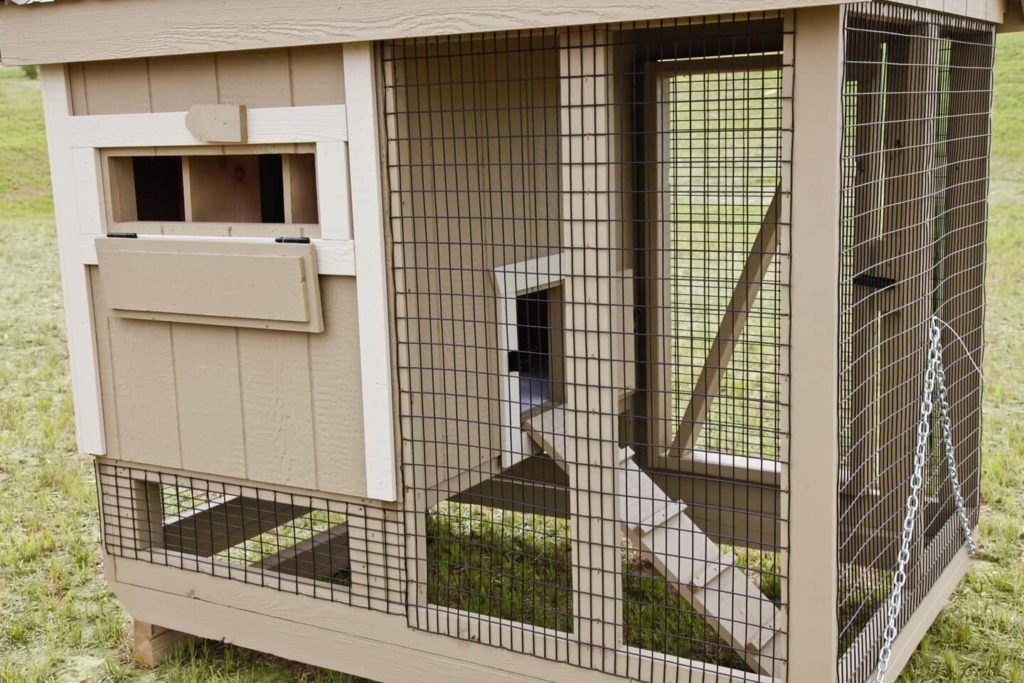
Aviary Netting
Aviary netting is similar to plastic netting. It’s not very effective when it comes to withstanding physical attacks from larger animals, but it’s useful when keeping aerial predators out. People tend to prefer aviary netting over plastic netting because it’s made from fine polypropylene mesh and blends into the background.
This type of netting is generally inexpensive and a good choice if you’re trying to protect smaller chicks from being picked up by larger birds. However, it should only be used to cover the top of certain areas, such as a chicken run, and not used as a fence.
Electric Poultry Netting
Electric poultry fencing has become more popular and affordable over the past few years. There are many different kinds of electric fencing, but all types do pretty much the same thing. They are made of metal wire that is woven with plastic fibers throughout the height and length of the fence. When an animal touches the wire, it will experience a quick shock.
This type of fencing can be powered by a main electric source, battery, or solar. There are temporary and semi-permanent options you can choose from when looking at electric fencing. We suggest you choose the temporary option if you frequently move your chickens because it’s lightweight and easier to manage.
Semi-permanent fencing is tougher and can withstand more abuse from animals or weather. The posts are also stronger and less likely to bend, however, setting them up can be more complex and time-consuming.
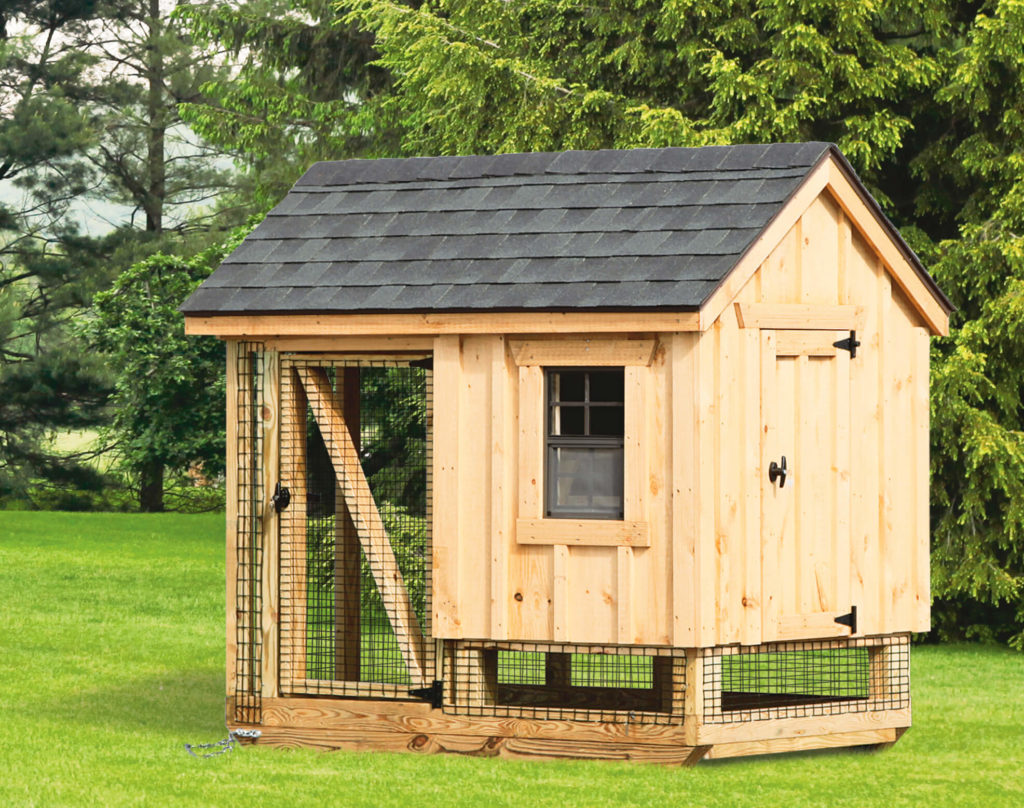
Want to Keep Your Chickens Safe?
Check out our custom-built chicken coops that come in a variety of styles & sizes to match your home’s aesthetic.
